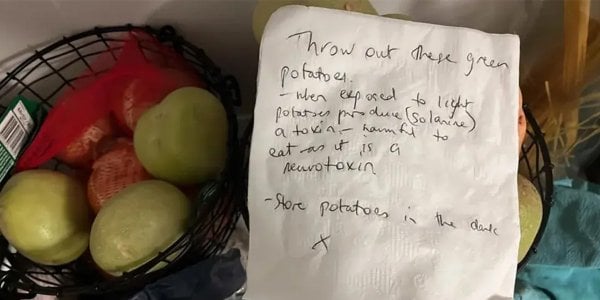This controversial handwritten note started a huge debate on food safety
By
VanessaC
- Replies 8
What started as an innocent note written on a napkin sparked an intense debate among social media users.
'Throw out these green potatoes. When exposed to light, potatoes produce (solanine) a toxin, harmful to eat as it is a neurotoxin. Store potatoes in the dark,’ it said.
The note, placed on a basket of vegetables, came from an Aussie mum and has elicited thousands of reactions online.
Apparently, sunlight exposure causes the skin of potatoes to turn green due to the formation of chlorophyll. It looks harmless–but it appears alongside a more dangerous compound, solanine.
Solanine is a toxic chemical known to accumulate under certain conditions in potatoes, and if ingested, may cause poisoning in people and livestock, according to the CSIRO.
If enough of the toxin is consumed, it may cause gastroenteritis. Still, due to poor absorption and rapid excretion in the stomach, it’s less likely to be fatal to humans than animals, although it has reportedly caused deaths in both.
So should you avoid green potatoes? Social media users were split–some argued that it was harmless to eat with one user saying, ‘I've been serving/eating green potatoes for 30+ years and never had an issue ever.’
While another user said that ‘Green potatoes are toxic’.
Food scientist Tina McLeish cautioned that while solanine in small quantities is not a big deal, it is best to avoid it if you’re pregnant.
'The toxins can cause nausea, vomiting, headaches and birth defects,' she warned. Meanwhile, consumer expert Sarah Murphy advised that it’s okay to eat green potatoes in moderation, but recommends avoiding consumption in large quantities.
'The best advice I give to people is to store your potatoes in a cool, dark place so they are fresh for as long as possible,' said Ms Murphy.
'Like any food, especially if they’re not as fresh, depending on the person, it can make us feel sluggish, give us diarrhoea or cause us to become sick.' She also confirmed that if a potato is green throughout or tastes bitter, it’s best to throw it out.
Effects of Solanine on the Body
When solanine is consumed, it might not immediately manifest its malevolent presence. It often starts by causing mild symptoms–an uncomfortable feeling in your stomach or a headache. The symptoms can progress to nausea, vomiting, and even diarrhoea.
Because solanine is a neurotoxin which affects the nervous system, it has the potential to cause confusion, dizziness and, in severe ca ses, hallucinations and paralysis.
Being mindful of food safety measures isn't just about avoiding solanine and green potatoes, so here are some general guidelines for food safety and storage:
There you have it, folks! Awareness of these safety measures may help you avoid food poisoning.

If you have other tips on how to store food properly in your pantry or fridge, share them with us in the comments section below!
'Throw out these green potatoes. When exposed to light, potatoes produce (solanine) a toxin, harmful to eat as it is a neurotoxin. Store potatoes in the dark,’ it said.
The note, placed on a basket of vegetables, came from an Aussie mum and has elicited thousands of reactions online.
Apparently, sunlight exposure causes the skin of potatoes to turn green due to the formation of chlorophyll. It looks harmless–but it appears alongside a more dangerous compound, solanine.
Solanine is a toxic chemical known to accumulate under certain conditions in potatoes, and if ingested, may cause poisoning in people and livestock, according to the CSIRO.
If enough of the toxin is consumed, it may cause gastroenteritis. Still, due to poor absorption and rapid excretion in the stomach, it’s less likely to be fatal to humans than animals, although it has reportedly caused deaths in both.
So should you avoid green potatoes? Social media users were split–some argued that it was harmless to eat with one user saying, ‘I've been serving/eating green potatoes for 30+ years and never had an issue ever.’
While another user said that ‘Green potatoes are toxic’.
Food scientist Tina McLeish cautioned that while solanine in small quantities is not a big deal, it is best to avoid it if you’re pregnant.
'The toxins can cause nausea, vomiting, headaches and birth defects,' she warned. Meanwhile, consumer expert Sarah Murphy advised that it’s okay to eat green potatoes in moderation, but recommends avoiding consumption in large quantities.
'The best advice I give to people is to store your potatoes in a cool, dark place so they are fresh for as long as possible,' said Ms Murphy.
'Like any food, especially if they’re not as fresh, depending on the person, it can make us feel sluggish, give us diarrhoea or cause us to become sick.' She also confirmed that if a potato is green throughout or tastes bitter, it’s best to throw it out.
Effects of Solanine on the Body
When solanine is consumed, it might not immediately manifest its malevolent presence. It often starts by causing mild symptoms–an uncomfortable feeling in your stomach or a headache. The symptoms can progress to nausea, vomiting, and even diarrhoea.
Because solanine is a neurotoxin which affects the nervous system, it has the potential to cause confusion, dizziness and, in severe ca ses, hallucinations and paralysis.
Being mindful of food safety measures isn't just about avoiding solanine and green potatoes, so here are some general guidelines for food safety and storage:
- Potatoes should be kept in a cool and dark spot. Check them regularly for sprouts or any unsightly green hue; if you spot any, remember to throw them away.
- Keeping your raw meats, poultry, and seafood separate from other foods in your fridge curbs contamination.
- Fruits are also known to emit Ethylene gas as it ripens. Save your veggies and store your fruits and veggies separately.
- For your eggs, always check the expiry date when purchasing. Refrigerate them in their carton and don't use them past their expiration.
- Using storage containers will preserve freshness for longer. Don't forget to wash them regularly or to pop them in the dishwasher.
- Finally, know when to say goodbye to the leftovers in your fridge.
There you have it, folks! Awareness of these safety measures may help you avoid food poisoning.
Key Takeaways
- An Aussie mum's handwritten note advising against eating green potatoes has sparked a food safety debate.
- Sunlight exposure causes potato skin to turn green producing solanine, a potentially harmful toxin.
- Food scientist Tina McLeish confirmed that consuming green potatoes in small quantities is not typically harmful.
- Consumer expert Sarah Murphy recommended storing potatoes in a cool, dark place to maintain freshness and to discard any potato that is green throughout or tastes bitter.
If you have other tips on how to store food properly in your pantry or fridge, share them with us in the comments section below!









